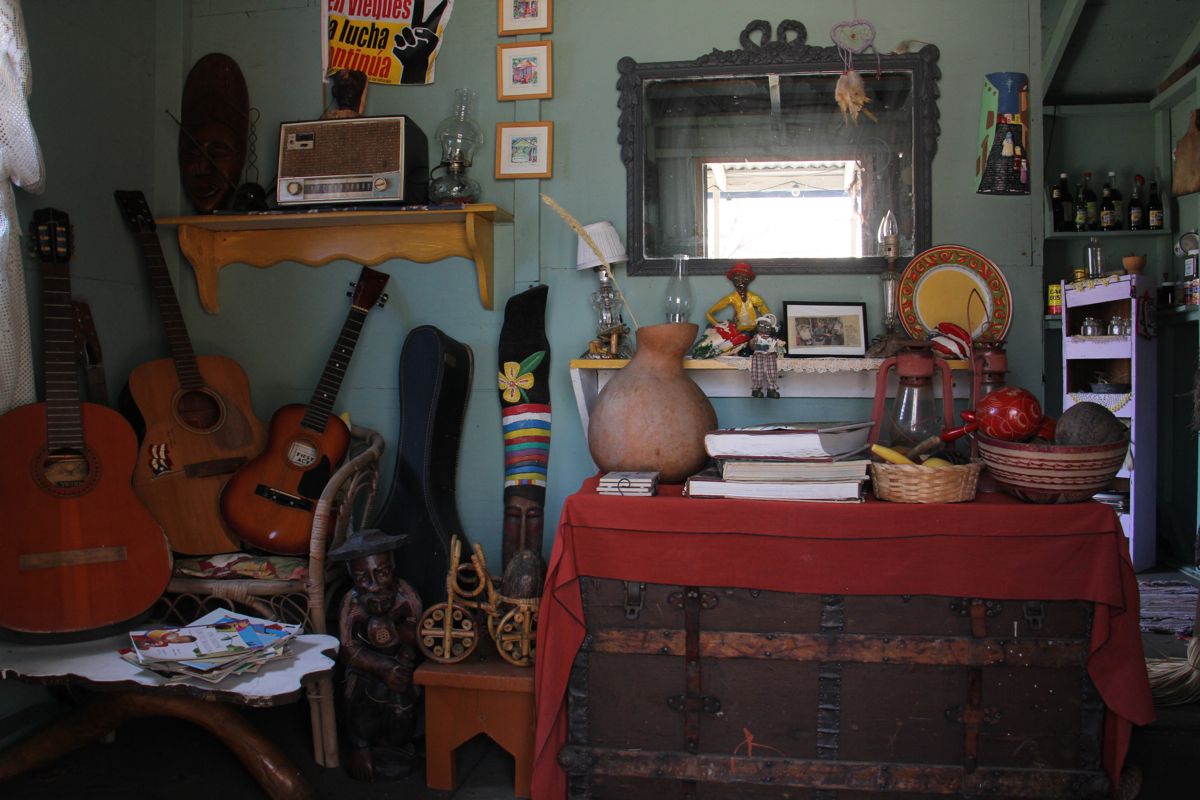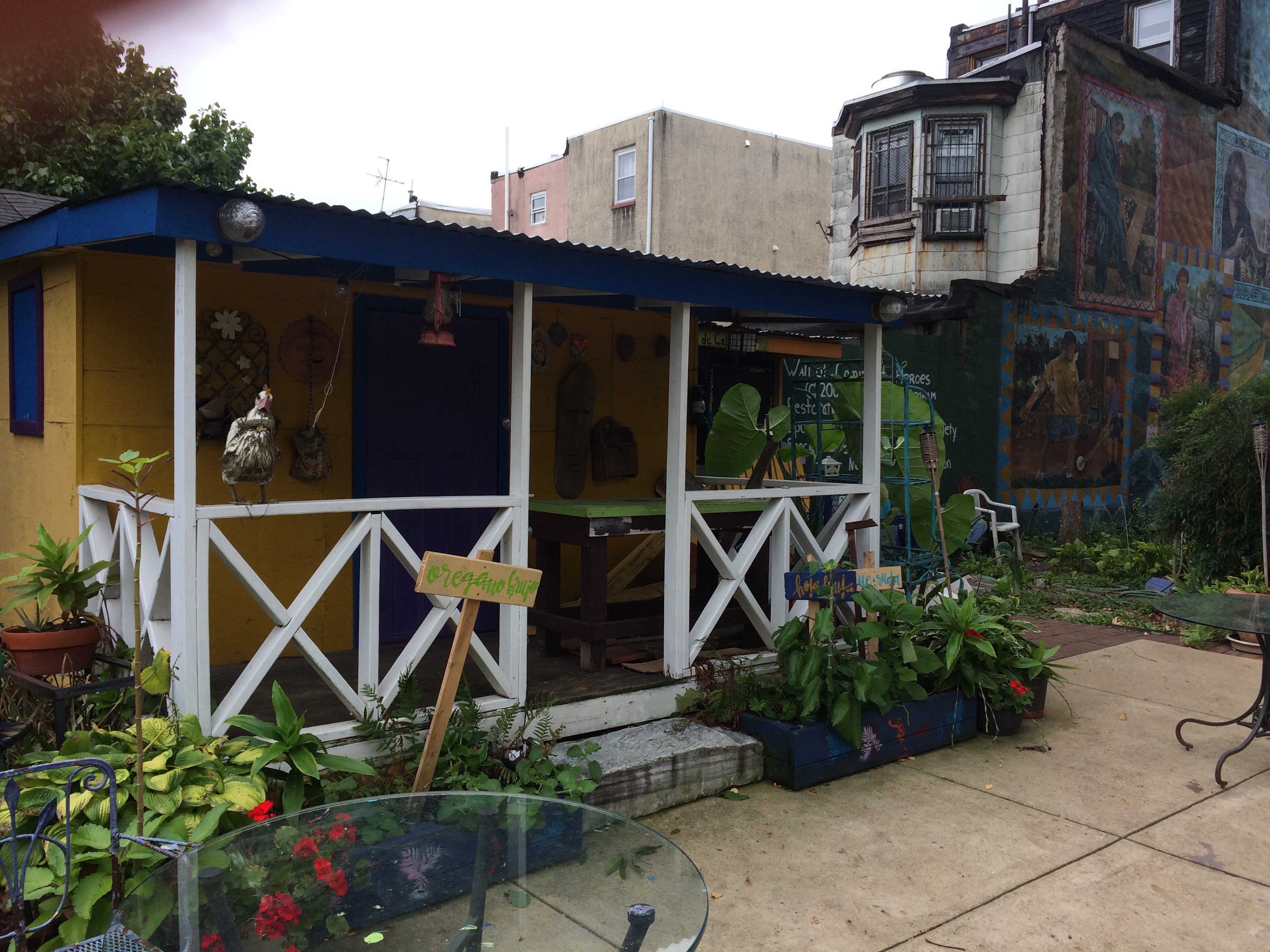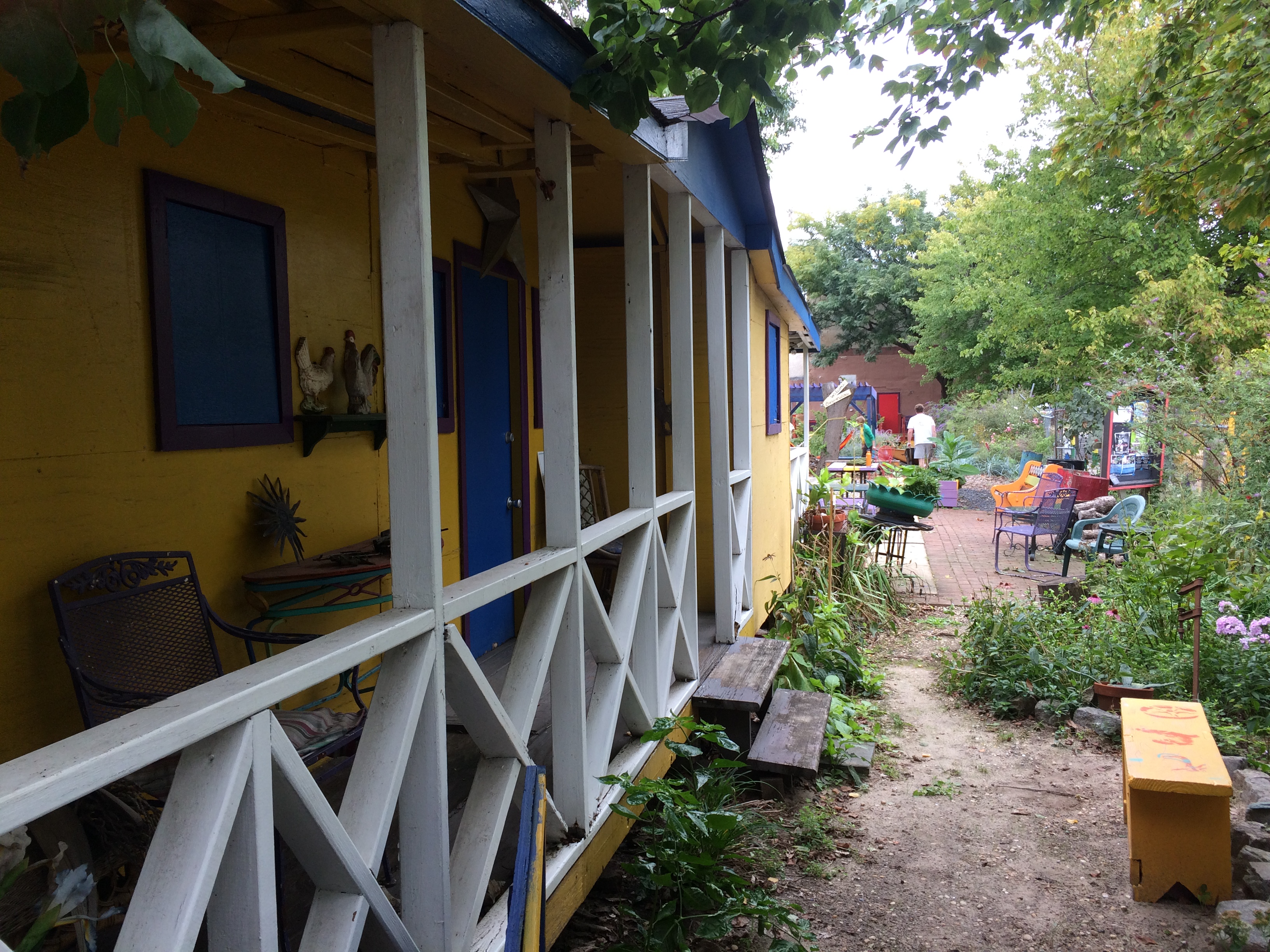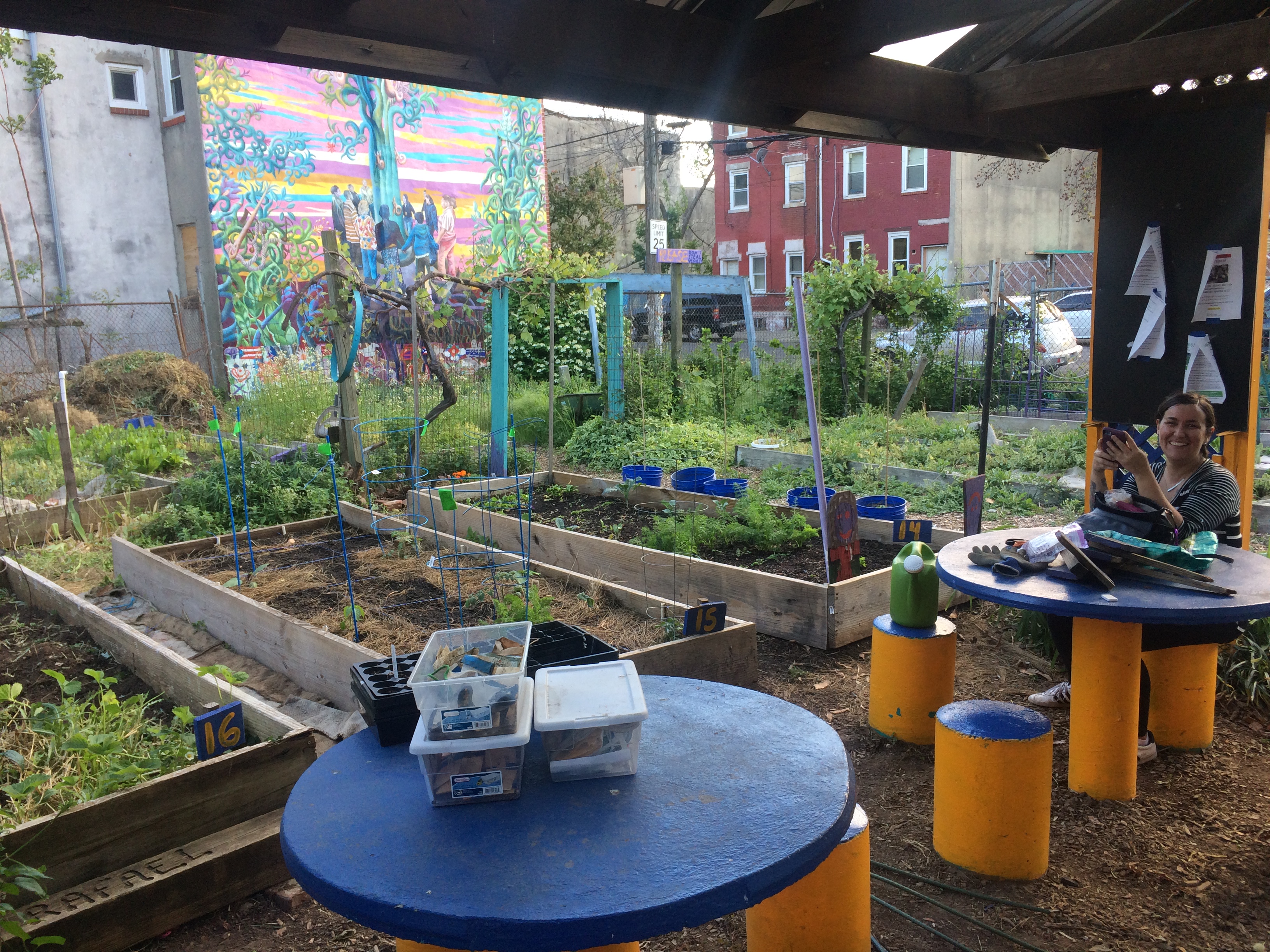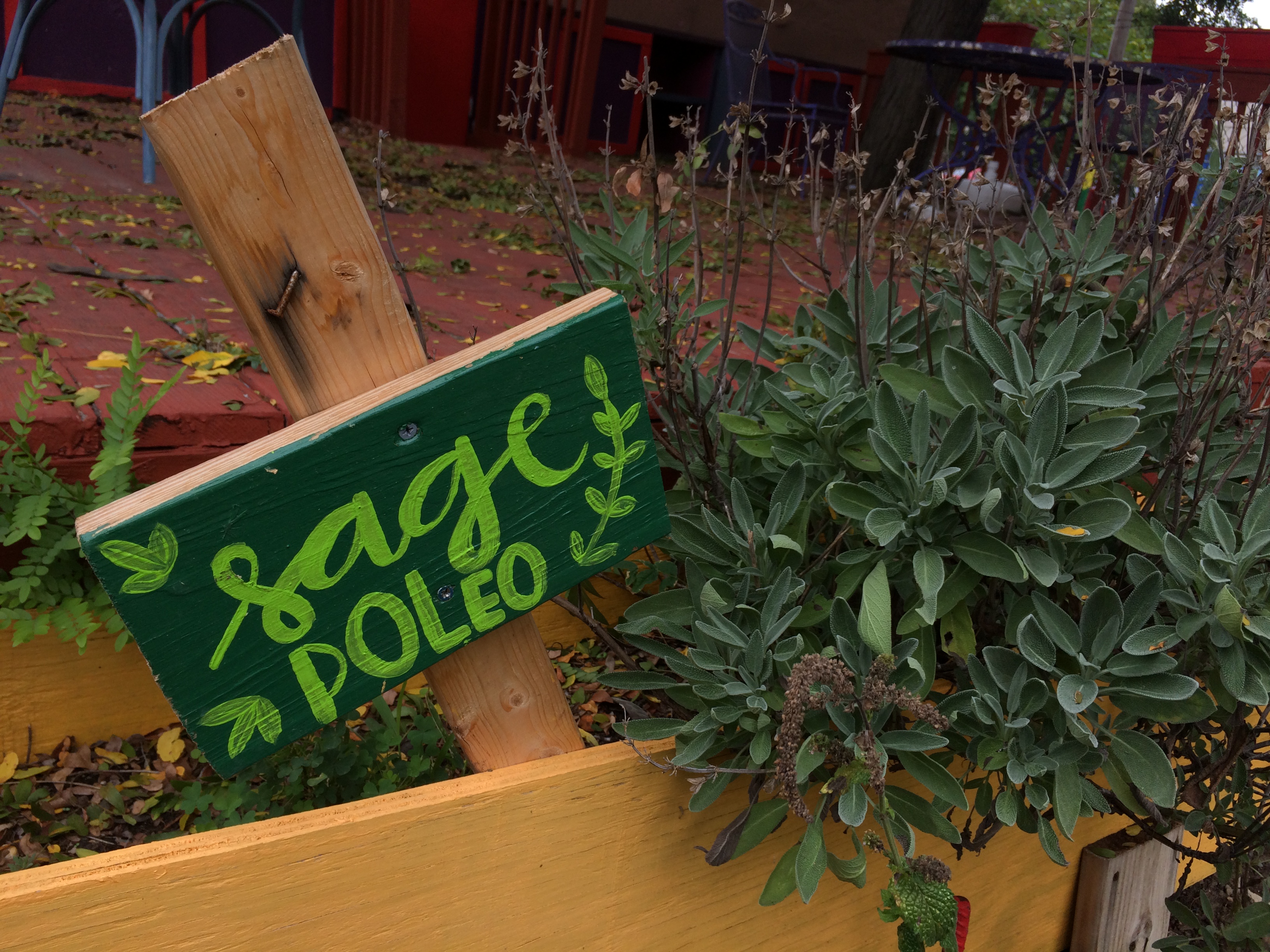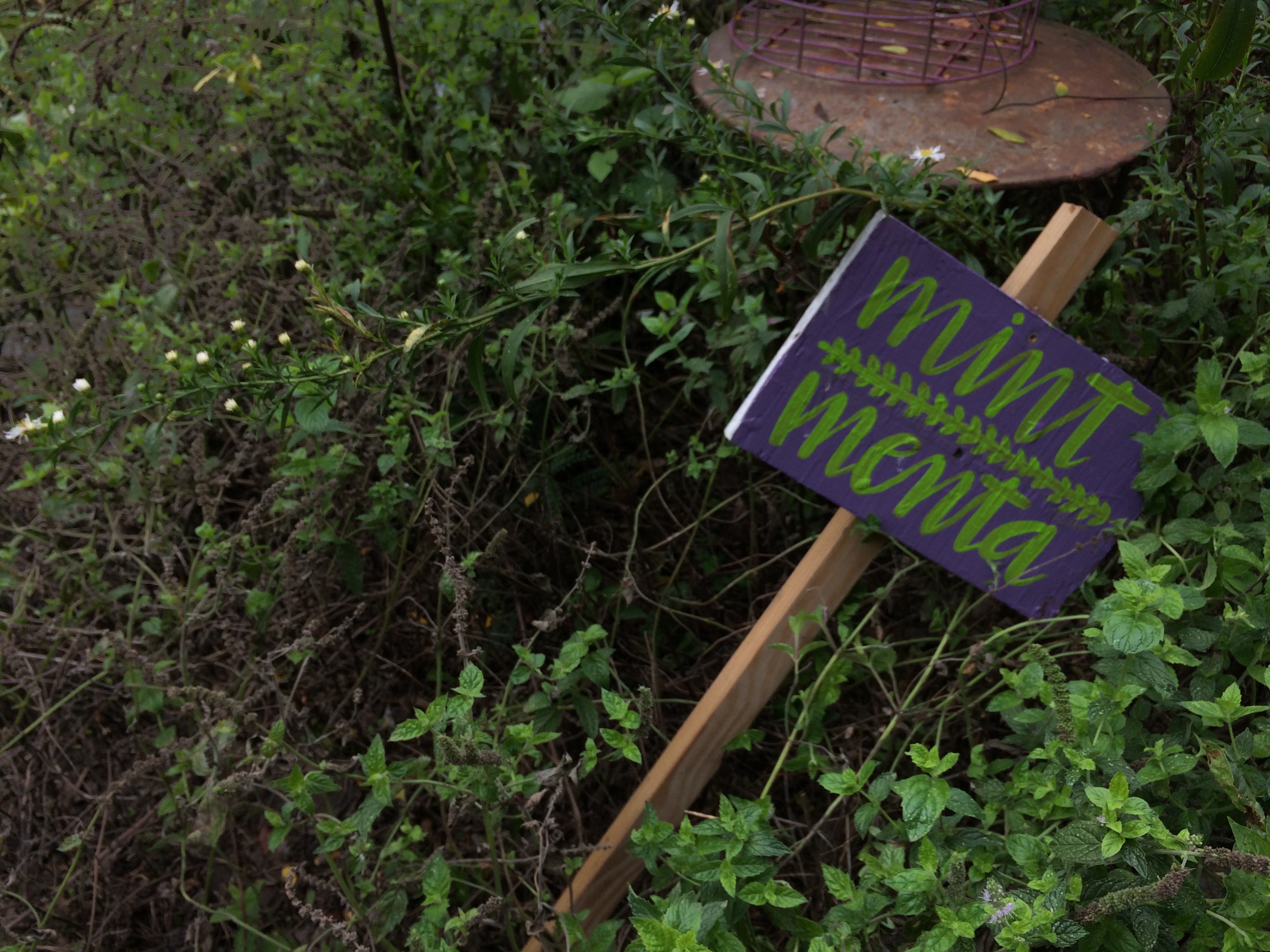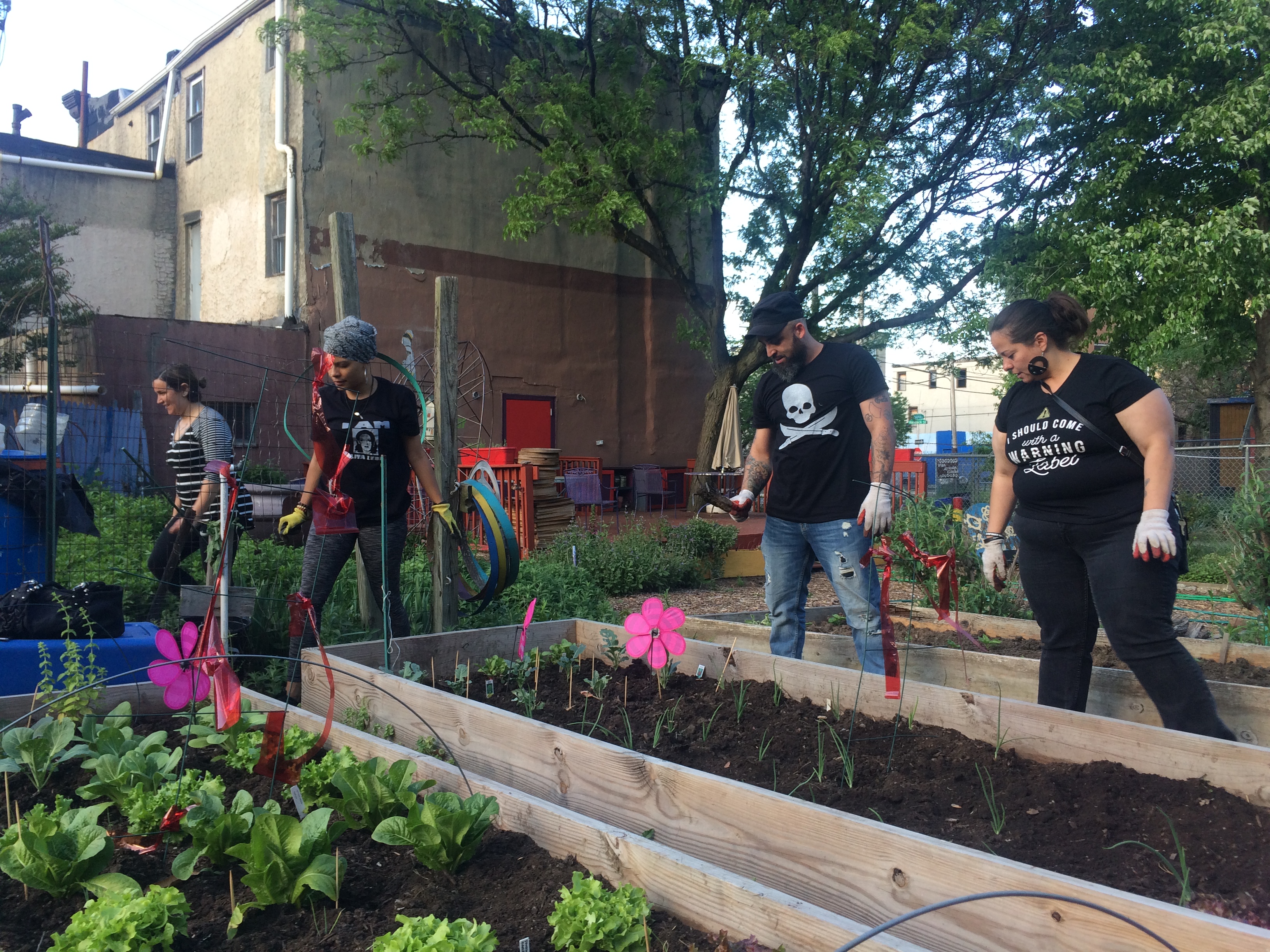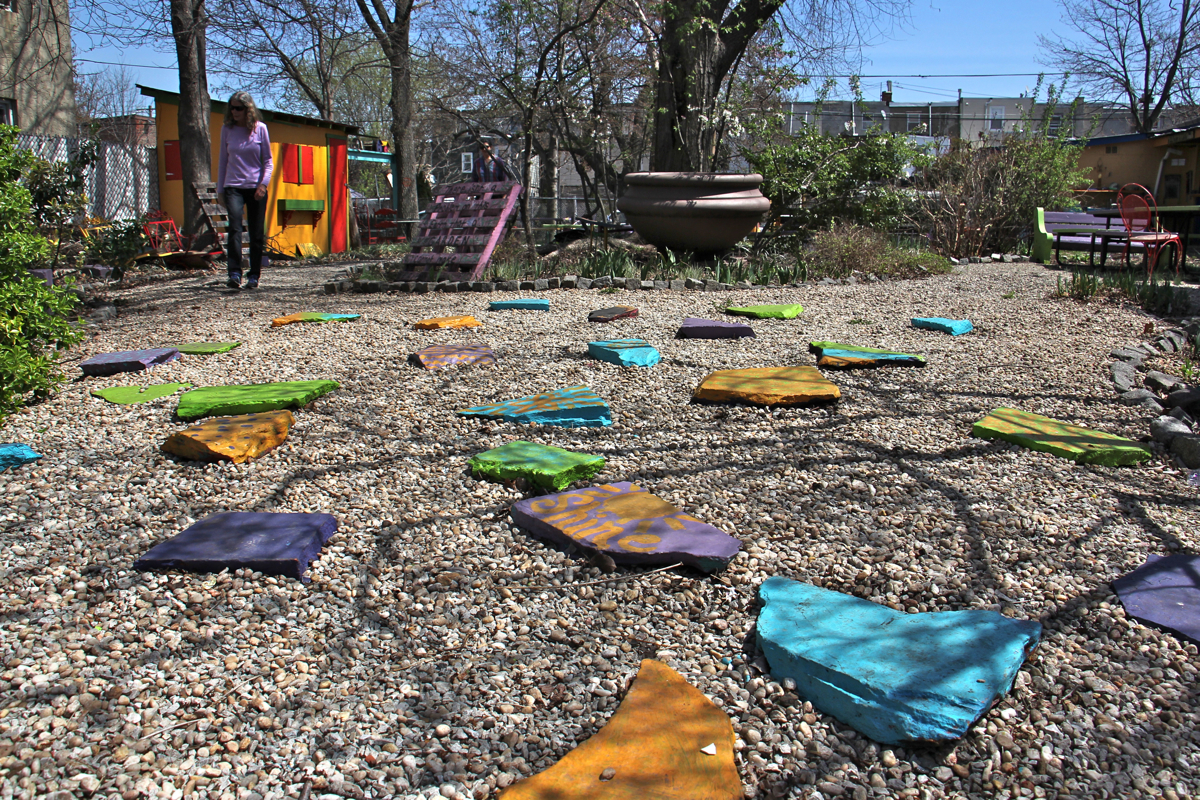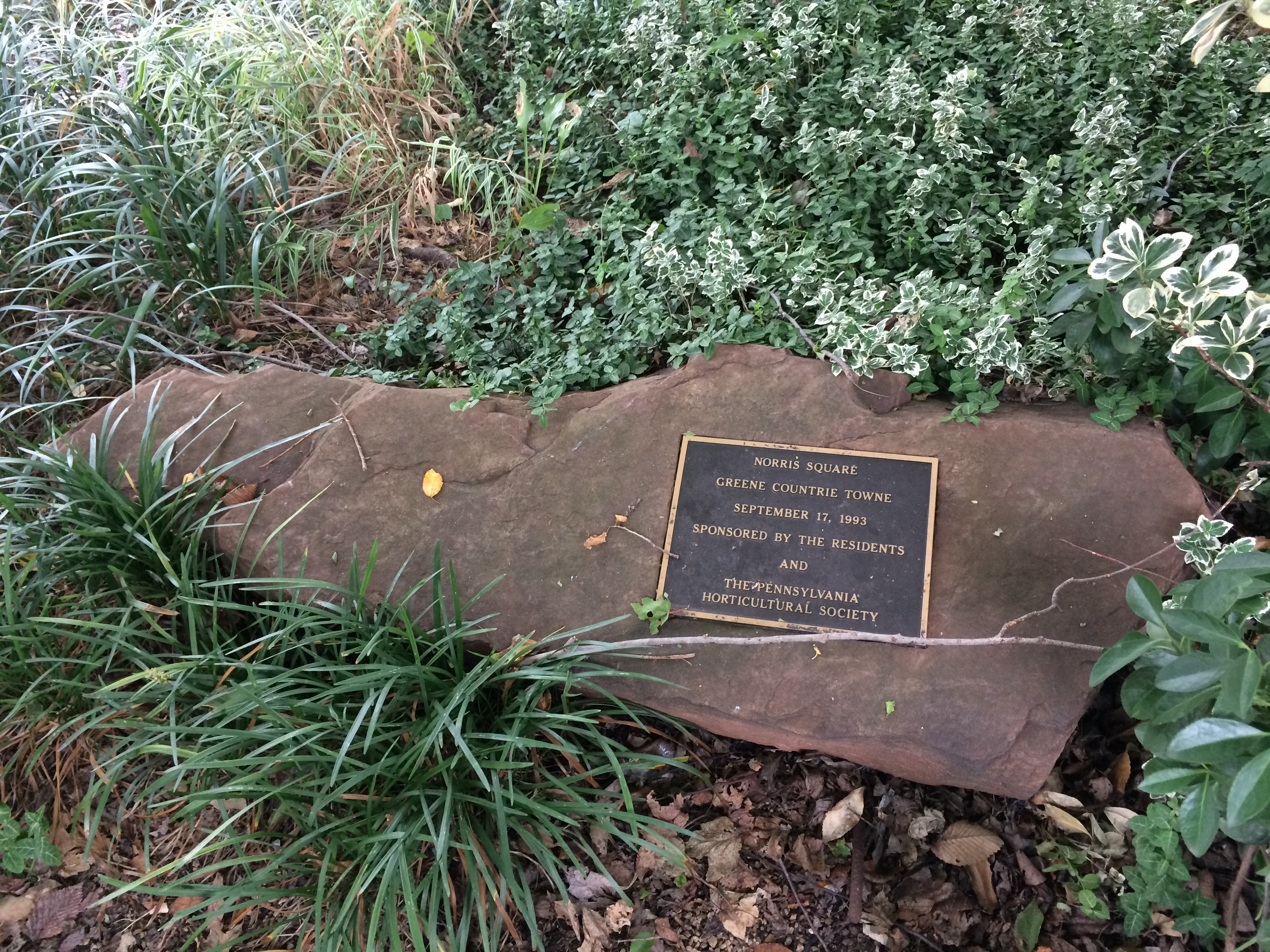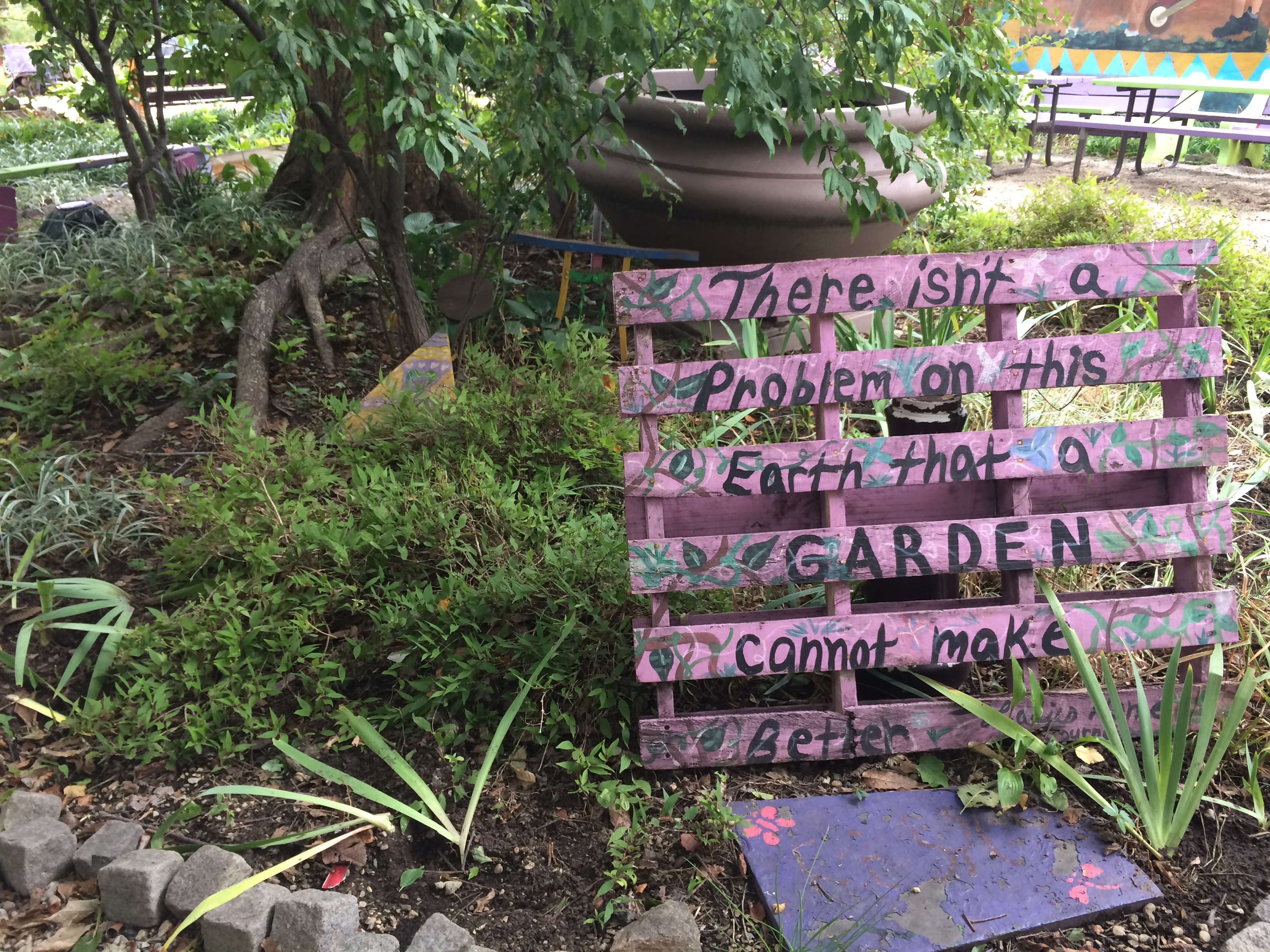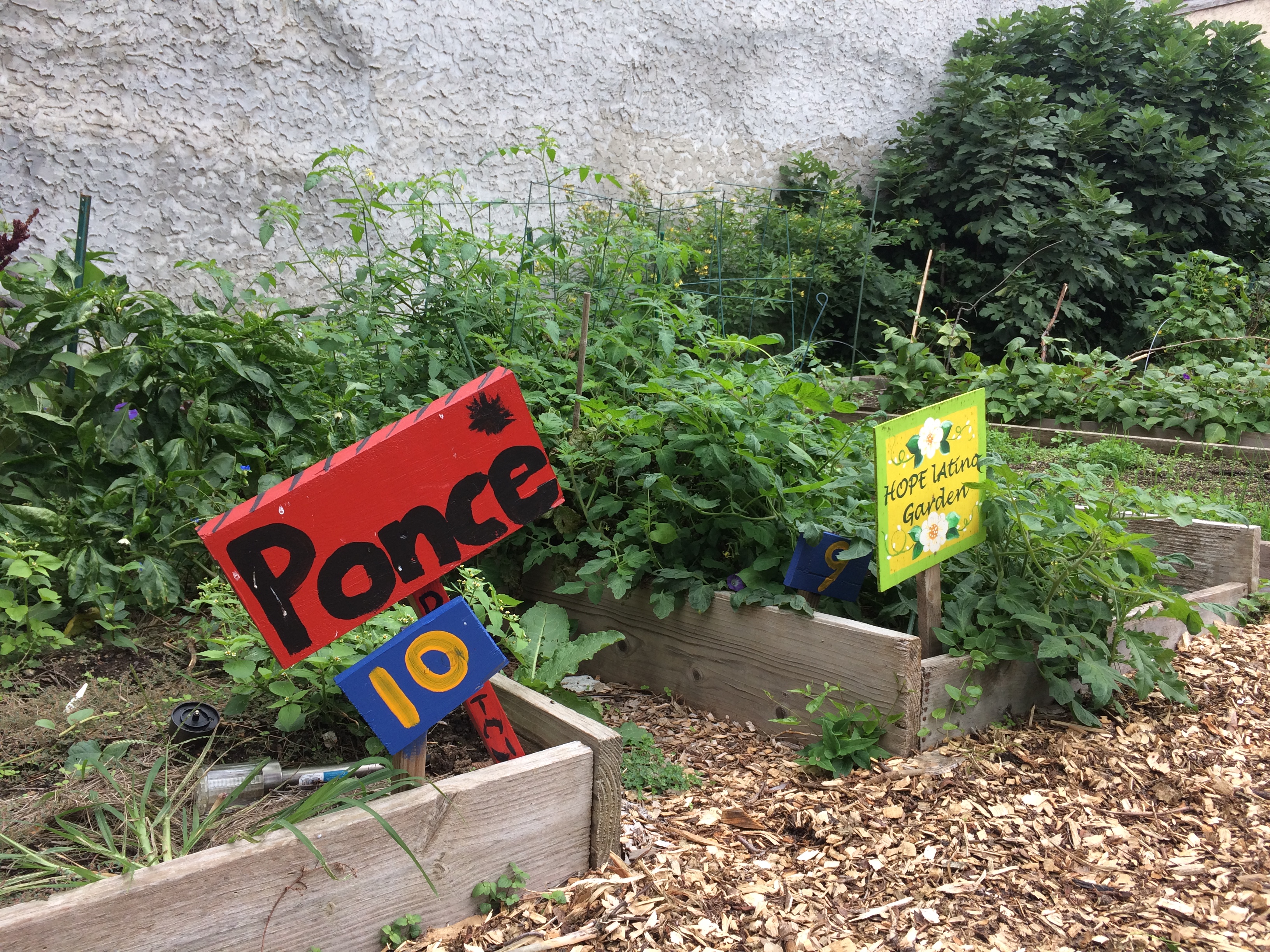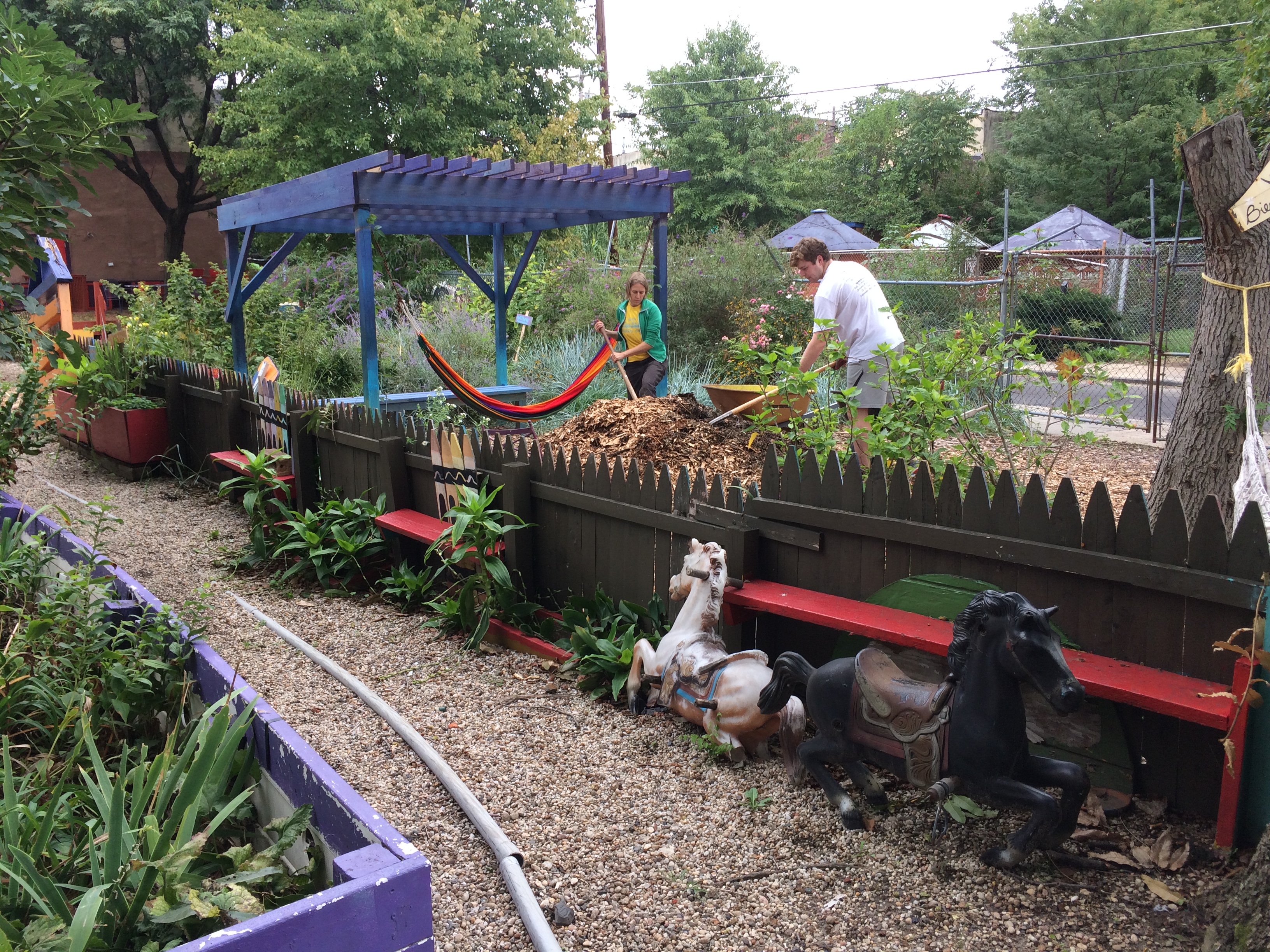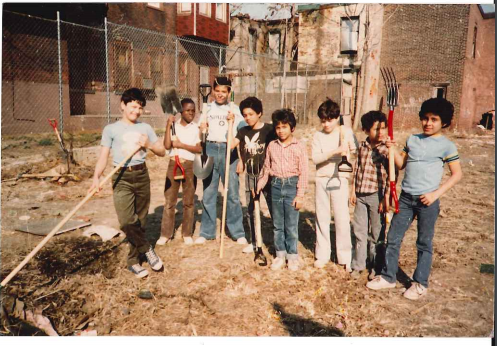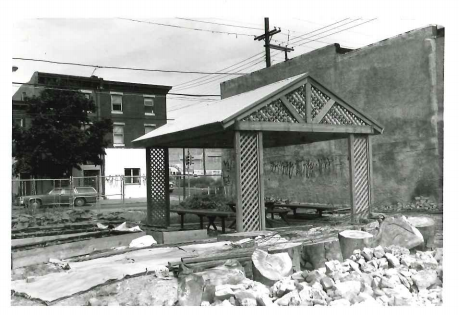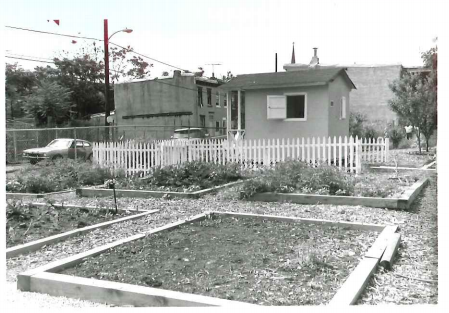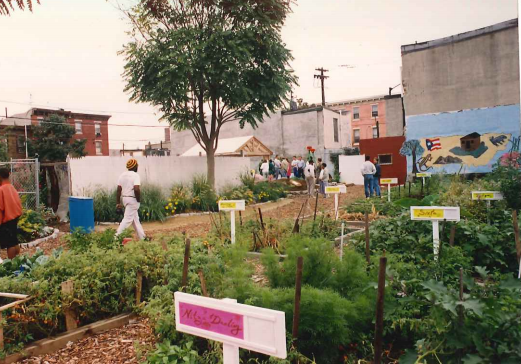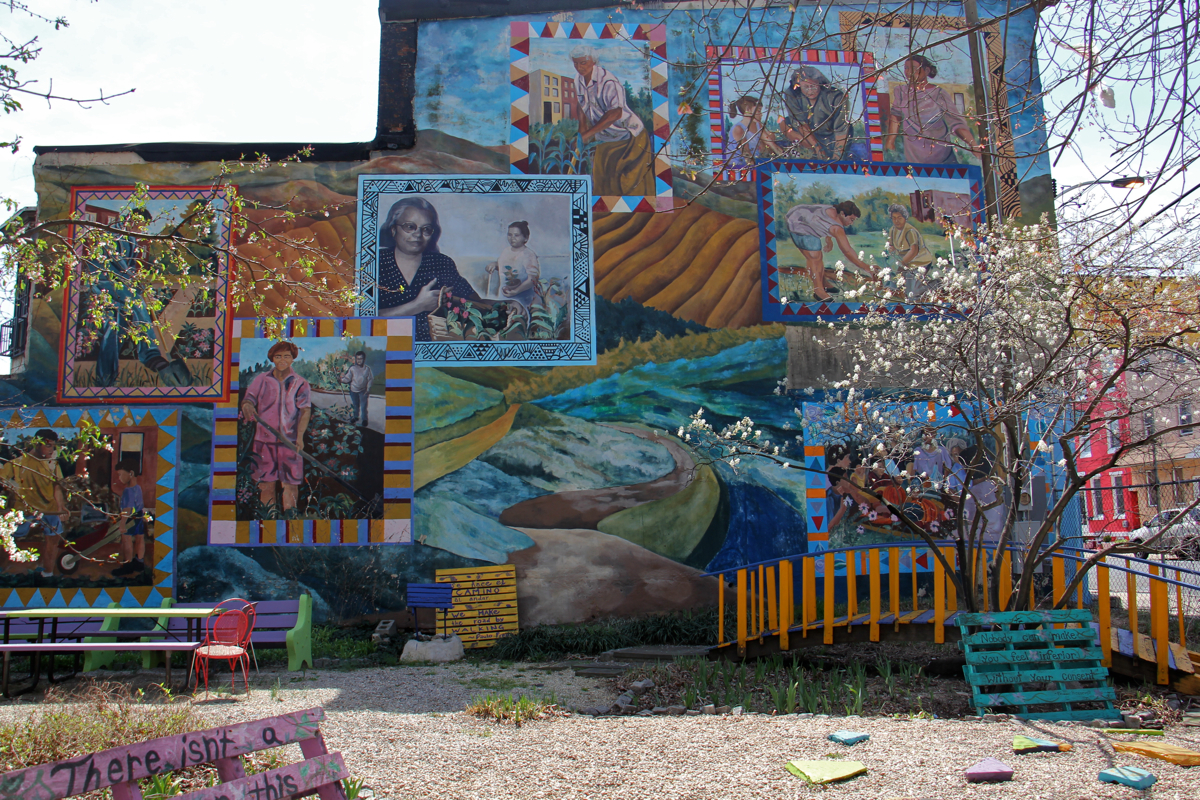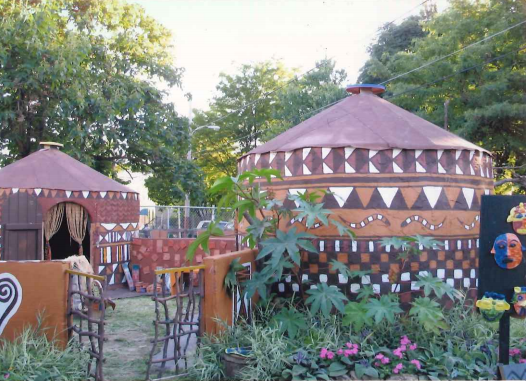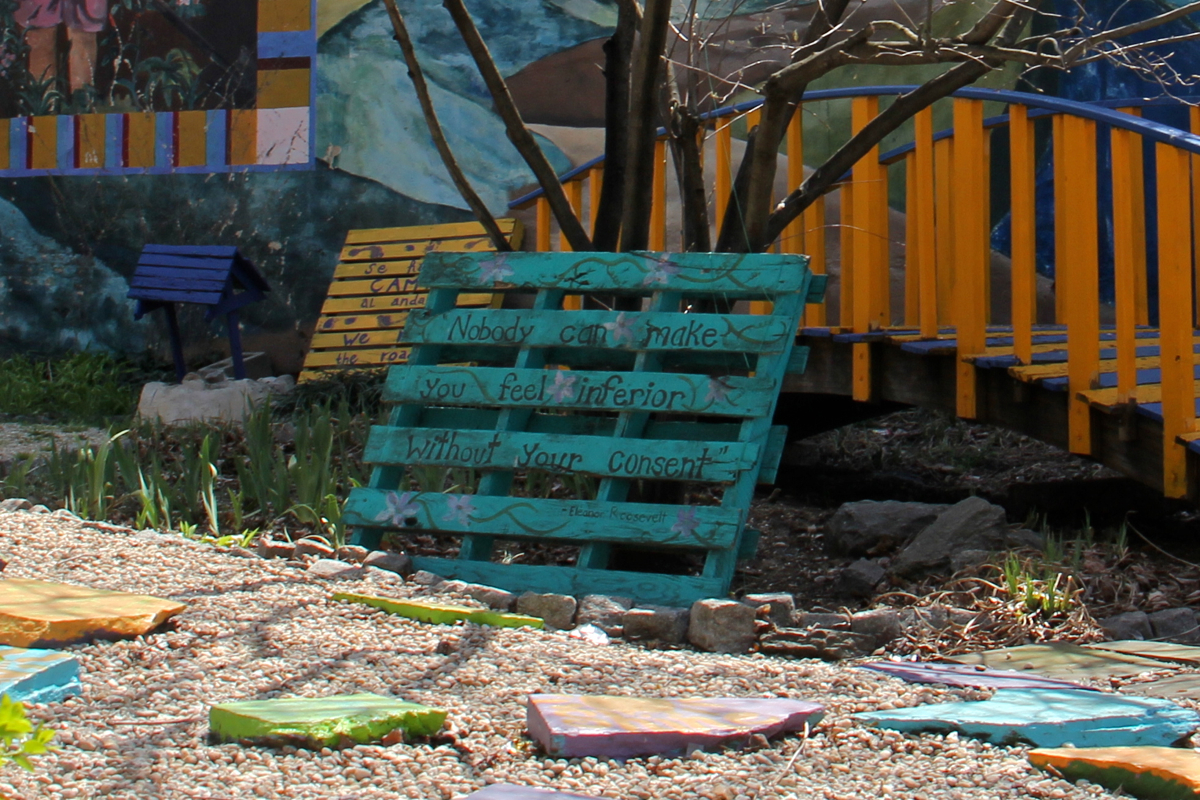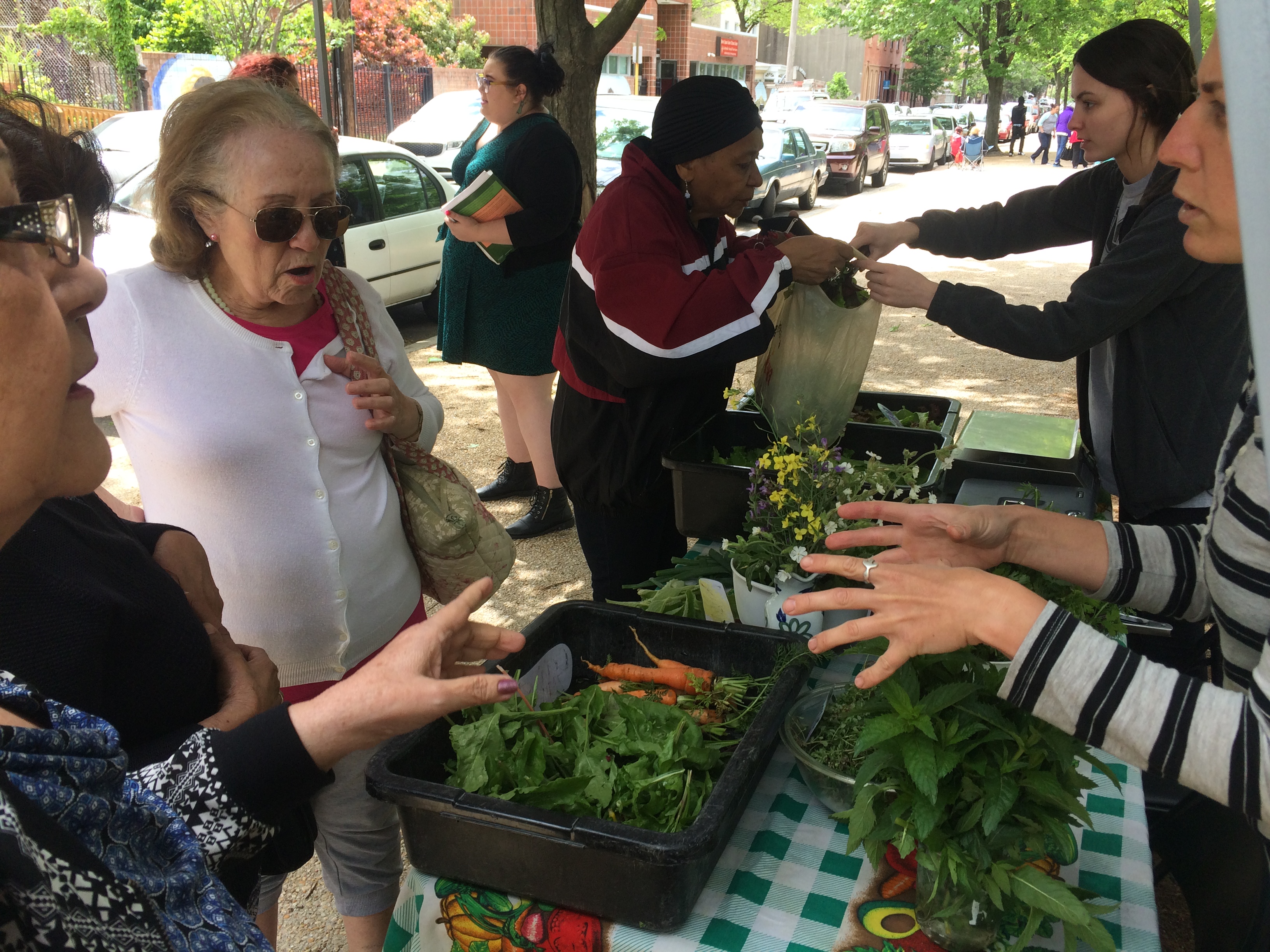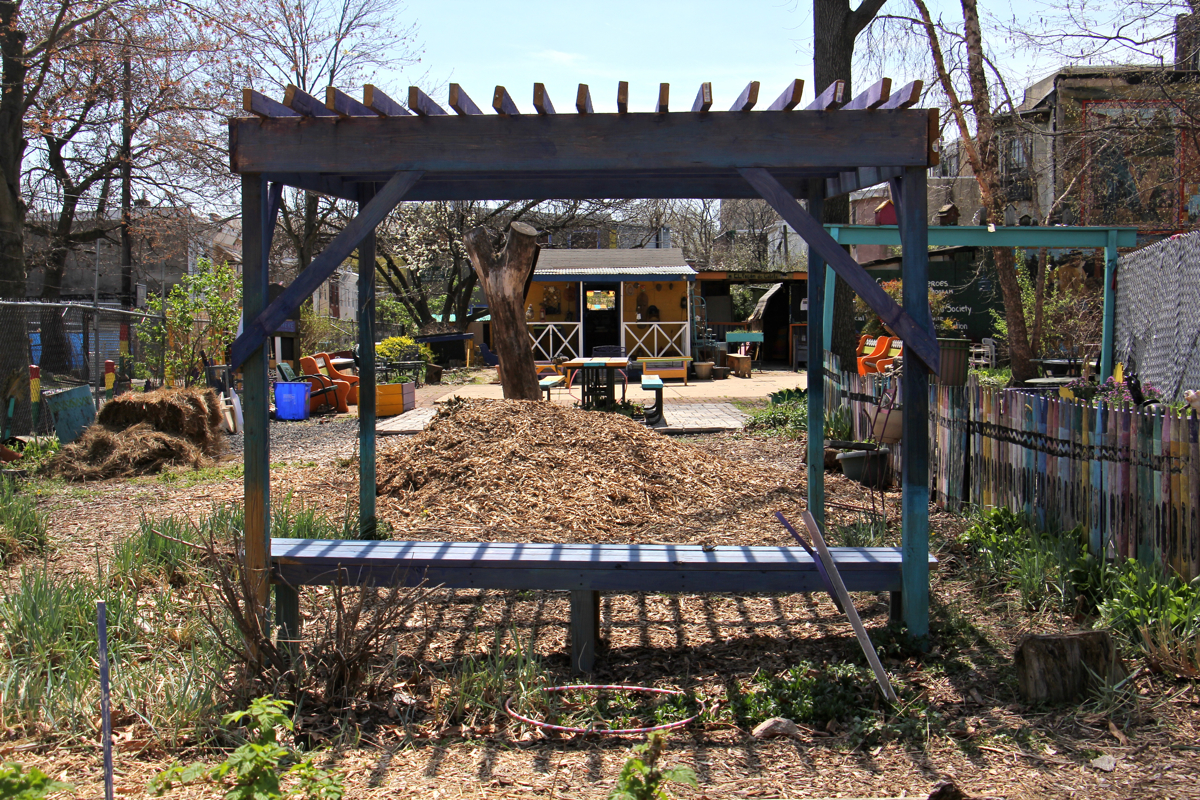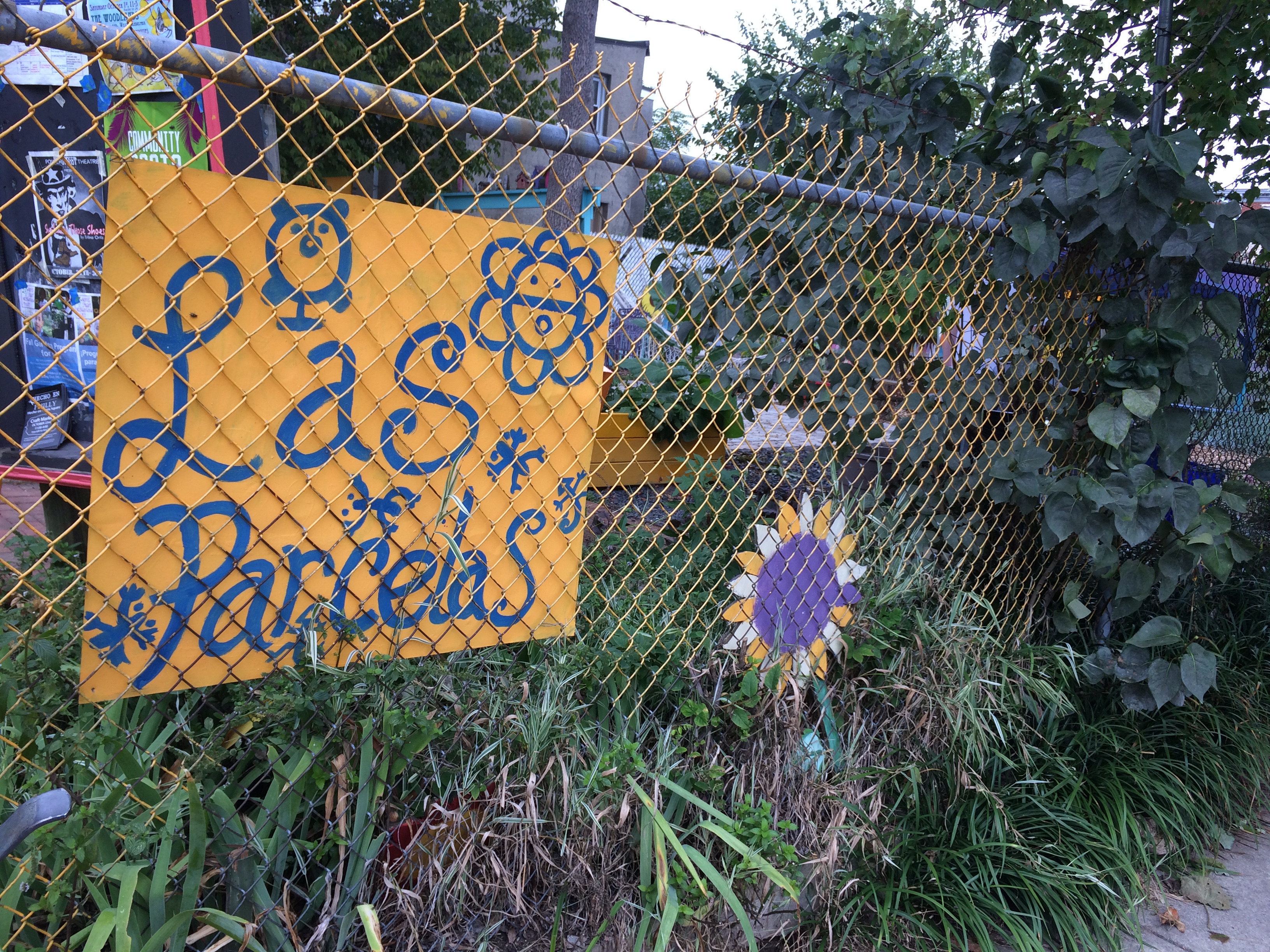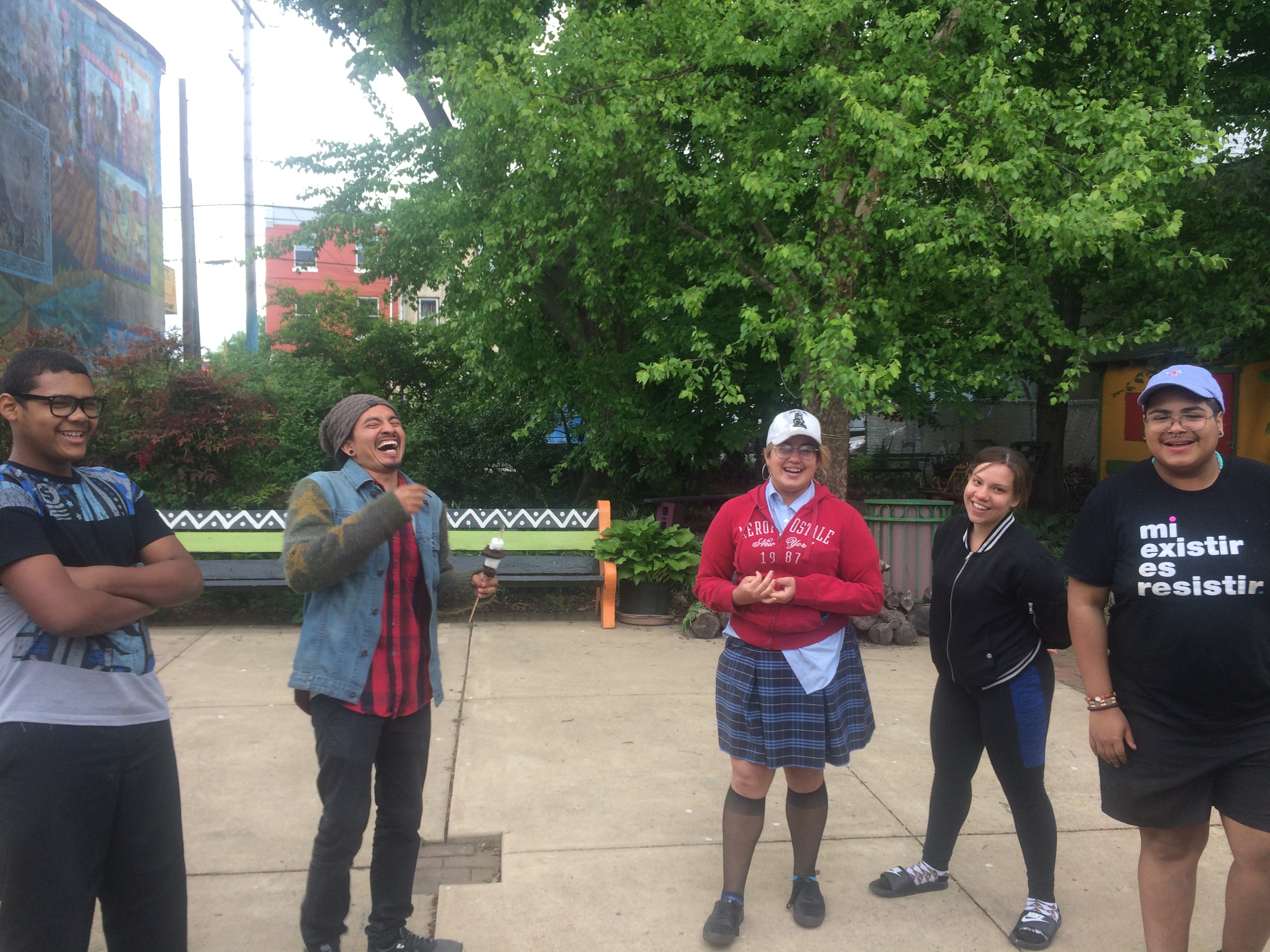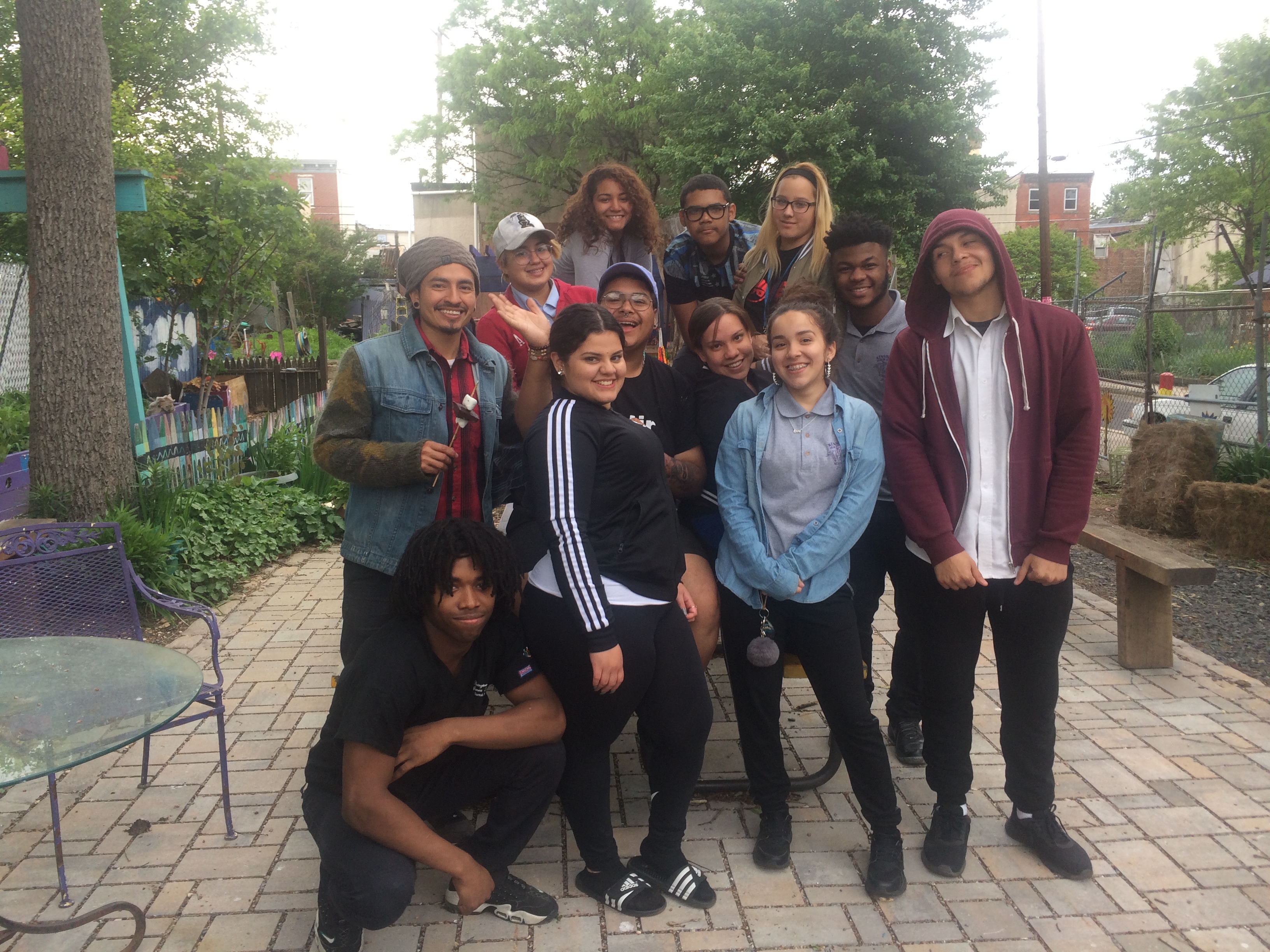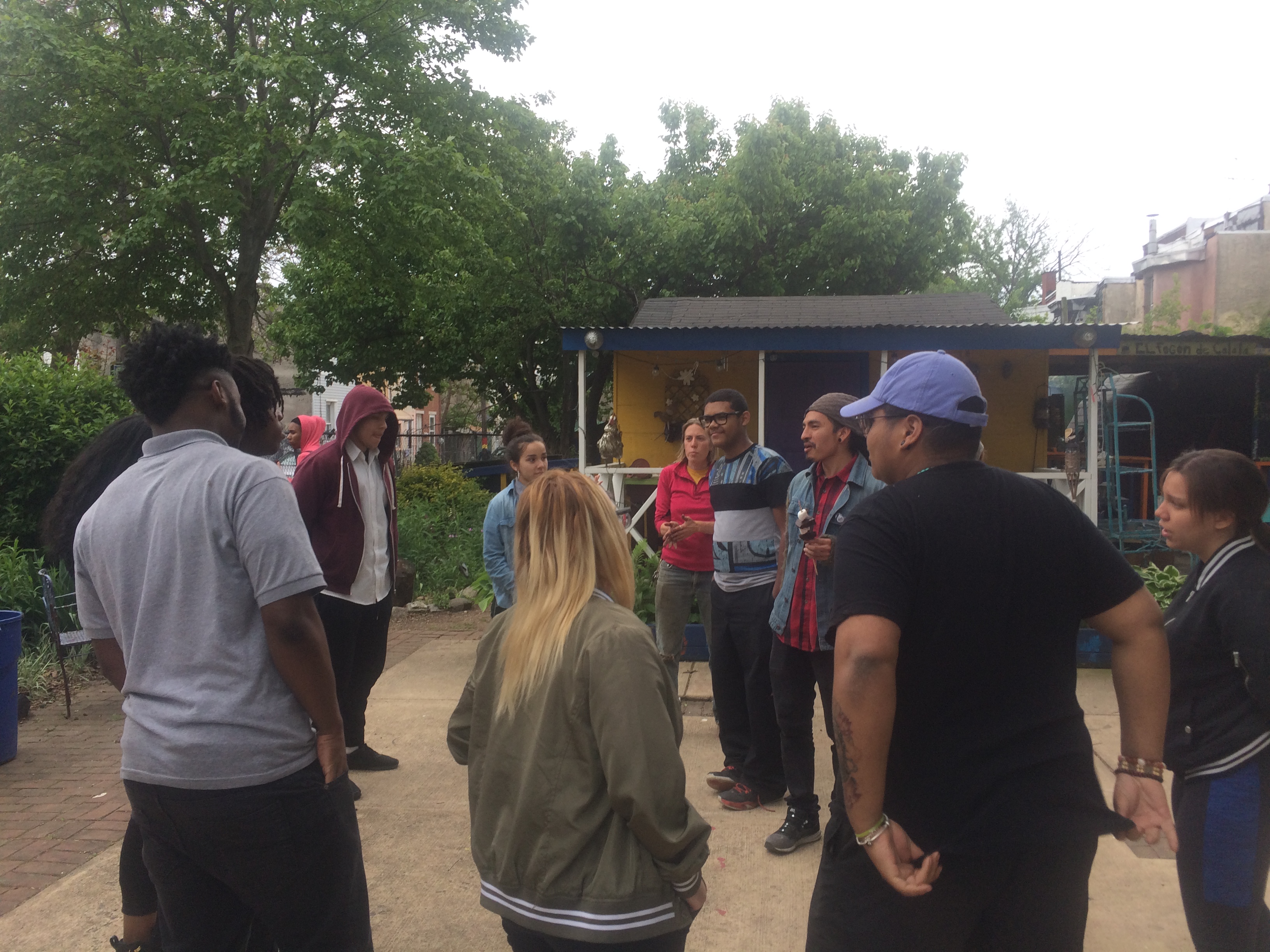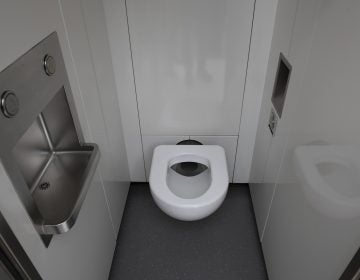As Norris Square changes, Las Parcelas puts down new roots
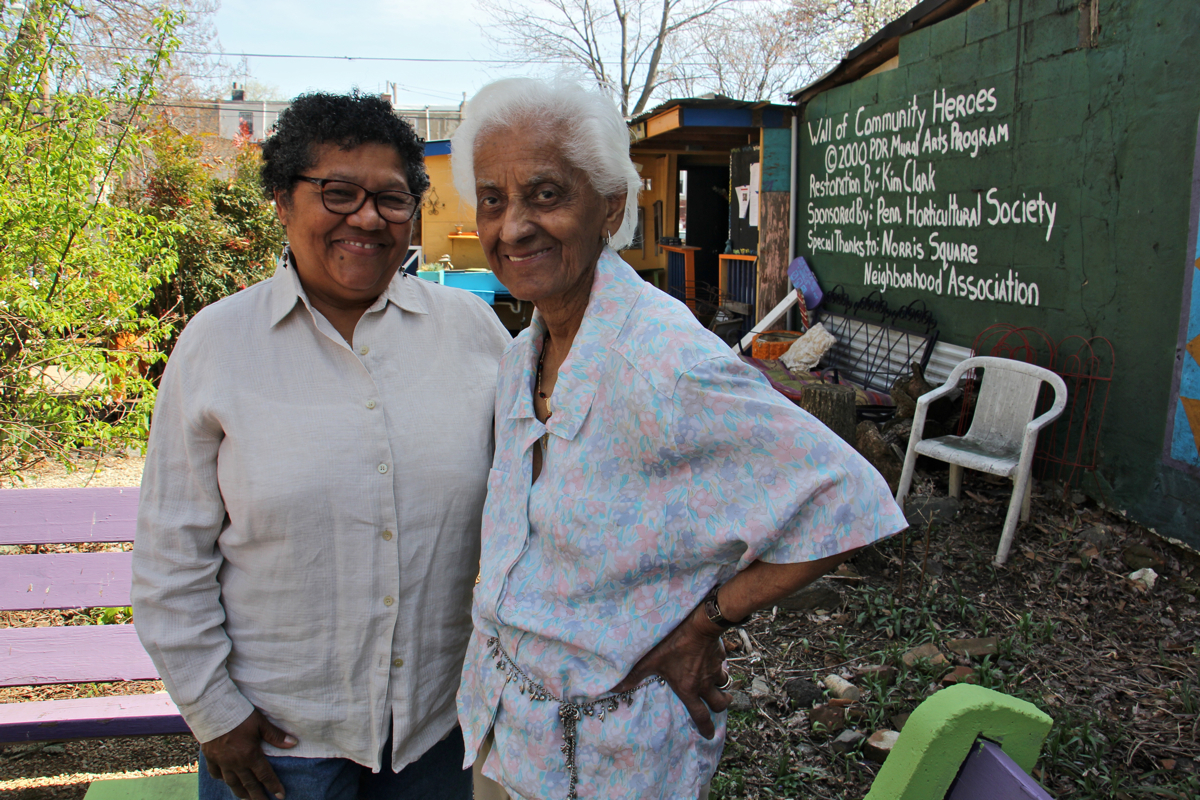
On a recent Tuesday evening, Ana Montañez was weeding her garden plot at Las Parcelas, a landmark community garden located in West Kensington. She teaches kids how to grow food in two of the 30 garden plots with a neighborhood organization called Voces del Barrio.
Montañez lives a couple of blocks away and has been gardening at Las Parcelas for four years. She first visited the gardens for a Bomba y Plena event celebrating traditional Puerto Rican music styles and remembers feeling immediately at home.
“I’m Puerto Rican — but I was born here — but as a child I always travelled back, so it brought back a lot of memories of visiting my family back up in the mountains,” Montañez said while weeding.
The garden has colorful tables and benches, recycled objects turned into art, an open kitchen, hammocks, and signs with names of plants in English and Spanish.
One of the magical spots in the garden is a little house called la casita de las abuelas, or grandma’s house. It looks like a rural house in Puerto Rico; it feels like a tiny museum. It’s filled with objects brought from the island: musical instruments, books and utensils. And it has a small bedroom with an old bed, vintage dresses, and handmade dolls.
Iris Brown personally collected most of these objects. Given the neighborhood’s rapidly changing in demographics, she worries that their history will get erased.
“Every single object is here… to tell a story. To remember who we are, where we came from,” Brown said.
Brown is 70 year old but looks much younger. She has a serious attitude but a playful laugh that reveals an endearing gap between her two front teeth. She created Las Parcelas in the late 1980s with Tomasita Romero and a group of Puerto Rican women called Grupo Motivos. They all met at Norris Square Neighborhood Project (NSNP), an organization they co-founded in 1973.
Romero is thin, has white hair, and she exudes elegance. She’s 85 now and she’s been losing her memory. “My memory is half gone,” she said laughing, “don’t get old.” But there’s one thing she remembers well after all those years.
“Oh my goodness, we had drugs in every step, every where, every corner,” Romero said.
After a dispute with NSNP about a decade ago, Brown and Romero stopped tending this and five other gardens they had started from scratch (Villa Africana Colobo, Raíces, La Paz, El Batey and Butterfly). The organization prioritized arts programs over the gardening and took some support — and funds — from Grupo Motivos.
NSNP still manages the gardens, but it does not own all of the properties. Out of 37 lots used by the six gardens, the neighborhood organization owns 21. Nine of Las Parcelas’ lots are owned by the Philadelphia Redevelopment Authority, one is owned by the Philadelphia Housing Authority, and one is private.
“A garden is a solution for everything”
Las Parcelas was created as a refuge. Norris Square, in the 1980s, wasn’t safe. Houses were in bad condition, vacant lots attracted bad behavior, and heroin and cocaine became an epidemic. The neighborhood was stressed and declining, they were losing family members to hospitals and federal prisons. Romero and Brown started standing with neighbors on corners and holding candlelit vigils to discourage sellers and buyers.
“We were losing our hospitals, our schools… We were losing hope. They took 60 something people to federal prison in one day. And people were suffering. And we were tired,” Brown said.
Kids couldn’t play outside and people didn’t have a place to hangout, which made everyone feel more isolated. In the middle of the despair, Brown saw a way out. She heard that the Pennsylvania Horticultural Society (PHS) was funding gardening projects through a new grant program called Greene Countrie Towne.
“I believe that a garden is a solution for everything,” Brown said. “So we saw this opportunity like if you were drowning and that was that piece of driftwood that came.”
With the grant and the support of NSNP they dug in. They took the asphalt out of a parking lot and cleaned vacant lots. “We didn’t sleep, this became our lives,” Brown said.
Las Parcelas was dedicated in 1993 with music, neighbors, politicians, and white doves released into the sky. It was raining, but the celebrations lasted two days.
“I will divide ‘horti-culture’ and I would say ‘culture’ will come first. Because nobody was thinking of horticulture in this community when everybody was in pain,” Brown said. “We needed the colors, we needed the dance, and the music, and the food, and the companionship. That’s what we know.”
Soon, Las Parcelas became the place to be. Women no longer stayed at home waiting for their husbands. They organized musical festivals and parties. They shared stories while cultivating pigeon peas and chilies, cooking dishes from their home countries, and teaching their kids how to grow food.
“Once they started gathering together, becoming this group, they became this force,” said PHS’s Eileen Gallagher, who helped Grupo Motivos create the gardens. “People became empowered, I think that was one of the biggest changes.”
It wasn’t always easy. Gangs would trespass on the gardens, paint graffiti on the hubs at the Colobo Garden, and used them to party, leaving trash behind. But Brown didn’t give up.
“We became unstoppable, they couldn’t stop us,” Brown says laughing.
By reconnecting people to their roots and heritage, and by integrating instead of marginalizing, Las Parcelas gave neighbors a new sense of dignity.
“Working in the gardens really helped us transform our neighborhood to something more beneficial,” Romero said. “And we saw the change little by little.”
“They are so strong,” said University of Pennsylvania Urban Studies’ professor Michael Nairn about Brown and Romero.
Nairn and his colleague Domenic Vitiello were so impressed by the women’s work transforming the neighborhood that they wrote about Las Parcelas in academic papers and took international visitors to see the gardens. Brown and Romero were invited to give speeches and won gardening prizes, including one in Paris.
There are many community gardens in Philadelphia, but Nairn and many others interviewed for this story said Las Parcelas is unique.
“It’s love,” says Nairn. “It’s about the love of gardening, it’s about the love for the community, it’s about this very special place that all these women created.”
NSNP’s executive director Justin Trezza agrees. It’s the fact that they poured their “lives, blood, sweat and tears” into the gardens.
“Everyone talks about creative placemaking now a days, yet these were things that these women were doing without having a term,” Trezza said. “And they really kind of became these urban heroes and I think, years and years from now, they’re going to become legends.”
“Las Parcelas is our home”
Las Parcelas was created on vacant lots that nobody cared for, so the idea of losing them was not on their minds. Today it’s a different story. The zipcode where the gardens are has seen home prices rise 90 percent over 6 years, the fastest rise in Philadelphia. Many old residents, most of them Puerto Rican, fear being displaced.
“This is not our community anymore, we are like strangers in here now,” Brown said.
“In the last two months I’ve had two or three different developers contact us about our lots and express interest,” said Trezza.
The Redevelopment Authority is working with NSNP to transfer the ownership of the lots to Las Parcelas. Agency’s spokeswoman, Jamila Davis, told PlanPhilly in an email that, because of the transaction’s complexity, “it’s taking longer than initially expected, but we are getting there.” After that happens, the Neighborhood Gardens Trust (NGT) will hold a conservation easement on these lots, restricting the development rights for the properties and protecting Las Parcelas into the future.
Since 2013, NSNP has prioritized gardens as part of its mission once again. It has garden workshops for kids and adults, organize theater and music shows, and sells $1 fresh produce from the farm every Wednesday in Norris Square Park. Marian Dalke, the garden manager, has been filling Brown’s shoes, but she sees herself as a transition. She hopes someone from the community takes her place.
“It’s a challenge when you have a garden which is based in land, and grounded in place, and if you have a community that’s shifting, and the Puerto Rican community is being pushed further north, what does that do to a garden that is rooted in its place?” said Dalke.
NSNP and the Campesinos of Norris Square are doing two things. They opened garden membership to more newcomers — African American, Muslim, White and Hispanic — and they have been hiring young kids from the neighborhood to work on the gardens.
Bianca Maldonado is a 17-year old member of the youth gardening group called Raíces del Cambio, or roots of change. Walking around Las Parcelas, she points to the mural “of the community heros” and says the Grupo Motivos women inspire her. The gardens mean a lot to her
“Not only does it represents my culture, but we have a lot of our events hosted here in Las Parcelas so a lot of memories are built here,” Maldonado said. “Honestly I can say I love this because you see everything growing and then you get to eat it.”
For the Raíces del Cambio crew, there’s no doubt that the gardens will grow into the future.
“We’re going to continue the legacy, we’re already doing that as we speak,” Maldonado said. “If we make a stand, if we actually have people here and we let them know that we’re here and we’re not going to go anywhere, that they can’t take it away from us, because this is our home.”
On June 17, Las Parcelas will be open to all visitors, as the centerpiece for the 4th annual Community Gardens Day, hosted by the Neighborhood Gardens Trust. A recreation of “La Casita” will be exhibited in the Philadelphia Art Museum this fall as part of the PHL Assembled Project.
WHYY is your source for fact-based, in-depth journalism and information. As a nonprofit organization, we rely on financial support from readers like you. Please give today.



